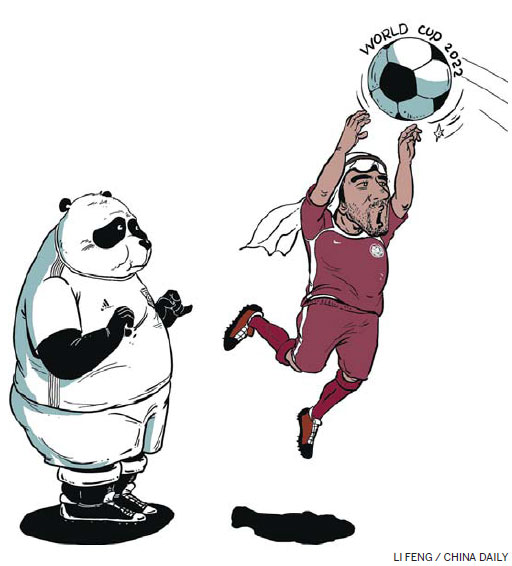China is a worthy World Cup host
Updated: 2014-07-11 07:25
By Gary Schwarz (China Daily Europe)
|
|||||||||||

It's a real possibility if Qatar's 2022 bid is found to have been tainted
Millions of soccer fans in China are getting up in the middle of the night or staying awake to watch the FIFA World Cup being played in distant Brazil. Inspired by the talent of the best soccer players and the overwhelming international attention that the World Cup gets, many Chinese soccer fans may be wondering how long they will have to wait to see the tournament being played on their home turf. It could happen sooner than some think.
Within days of the conclusion of the World Cup on July 13 (July 14 in China), Michael J. Garcia, FIFA's chief investigator, is expected to submit the results of his year-long investigation into possible corruption in the awarding of the 2022 World Cup to Qatar. If Garcia's report finds that Mohamed Bin Hammam, a former FIFA executive committee member from Qatar, paid bribes to gain votes for his country, a new host may have to be found quickly.
Major FIFA sponsors, such as Sony, Visa and Adidas, have urged FIFA to take the bribery allegations seriously. And sponsors really count because they contribute nearly 10 billion yuan ($1.61 billion) over the four-year World Cup cycle. Already, FIFA President Joseph Blatter has said that awarding the World Cup to Qatar was a mistake, and FIFA Vice-President Jim Boyce has promised to support a new vote if corruption is proven in the Qatar affair.
With this year's World Cup in South America and the next in Europe (Russia competes in the European leg of FIFA qualifiers), FIFA logically would want to keep the 2022 World Cup in Asia (Africa hosted the 2010 World Cup). Japan and South Korea, co-hosts of the only World Cup played in Asia, in 2002, are not likely to be awarded another soon. And Middle East countries in general might be tainted by the Qatari controversy. So China could emerge as a strong contender to host the 2022 Cup.
FIFA sponsors might love the idea. Unlike Qatar, which would be the least populated country to host the tournament, China has the world's largest population - a boon for sponsors. China also has a big head start with infrastructure and experience. The 2008 Summer Olympic Games and the 2010 World Expo showed Beijing and Shanghai at their best. Hosting the World Cup would allow China to showcase other cities, too. (In Brazil, games are being played in 12 cities.) Also, the opportunity to demonstrate Chinese hospitality across the country could generate goodwill and soft power for China.
Another incentive is that China would automatically qualify to compete in the World Cup - only the second time in history. Home team spirit, along with the promotional run-up to World Cup, would accelerate China's efforts to catch up with top soccer-playing nations like Brazil, Argentina, Germany, Italy, Spain, England and others that have also hosted the event.
Still, the big question remains: Would Chinese decision-makers want the World Cup? A potential downside is the competitiveness of the Chinese men's soccer team. At the Beijing 2008 Olympics, Chinese athletes won 100 medals, more than half of them gold, elevating the home country to the top of the medals table. This impressive feat seems unlikely to be repeated with soccer, though. The technical and physical excellence of Chinese athletes may not be enough for the international soccer stage, where a few creative moments - built on years of experience and national tradition - can be decisive.
The fact that no Asian team reached the second round of the ongoing World Cup indicates that there is plenty of work ahead for Chinese footballers. Nurturing of creative talents is needed on the soccer field, as well as in many Chinese companies striving to transition from low-cost manufacturing into high-end innovation. Some experts say that a country can win the World Cup only if its children dream of growing up to be soccer stars. Hosting the tournament would instill in Chinese children the passion for soccer. And perhaps they would start dreaming about glory on the soccer field.
Besides, there is a tradition to build upon. As FIFA has acknowledged, a form of soccer was played in China during the Han Dynasty (206 BC-AD 220). By hosting the World Cup, China would finally bring the game to its ancient roots.
President Xi Jinping, fond of the "beautiful game", has previously said that his wish is to see China host the World Cup.
During his visit to China last month, British soccer star David Beckham said China could win the World Cup one day. If China gets to host the 2022 World Cup, it would be an important milestone in turning Beckham's remark and millions of Chinese soccer fans' hopes into reality.
The author is a faculty member at the Nottingham University Business School China and a Rajawali Fellow at the Harvard Kennedy School's Ash Center. The views do not necessarily reflect those of China Daily.
(China Daily European Weekly 07/11/2014 page11)
Today's Top News
Germany wins World Cup on Gotze's brilliance
German suspect was not in contact with spies: US
Xi makes 'symbolic' stop in Greece
Baidu big winner in World Cup
Luxury car sales accelerate
Pianist Lang is on his game in Rio
School helps HIV students
$2.9 billion in gambling assets seized
Hot Topics
Lunar probe , China growth forecasts, Emission rules get tougher, China seen through 'colored lens', International board,
Editor's Picks

|

|

|

|

|

|





